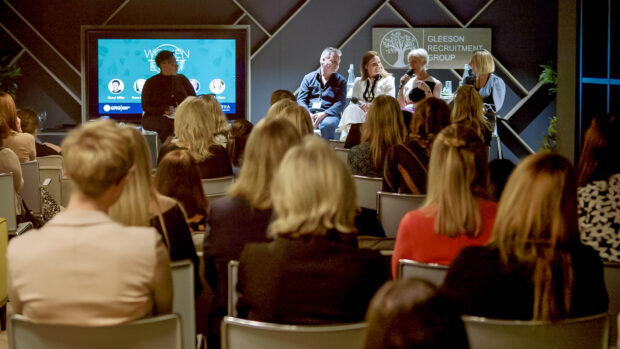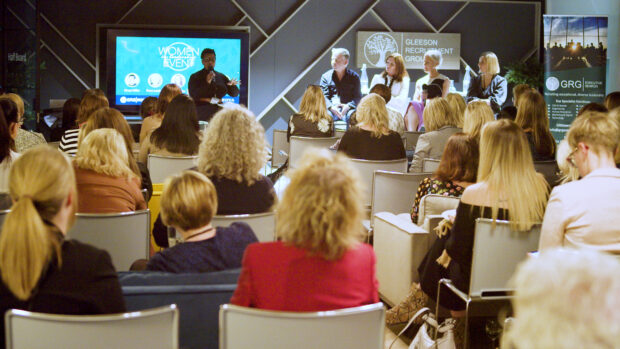
This article is the third in our series following the discussions that took place at GRG Executive Search’s Annual Executive Women In Business Event. The event was led by Director Helen Schwarz, who was joined by Diversity and Inclusion Advisor Sheryl Miller, Patrick Parsons Chief Executive Gail Bamforth, and CFO & Executive Director of Collins Aerospace Claire Bailey.
When we think of typical leadership traits, certain words are likely to spring to mind. Confident. Ambitious. Extroverted. Assertive. In most people’s minds, these are the qualities one must embody in order to get ahead, regardless of gender. Nevertheless, due to a historical lack of female leadership, we’ve come to incorrectly correlate such traits with men. Naturally, this poses a challenge for today’s female leaders, who often feel pressured to conform to certain stereotypes, and amend their behaviour as a result.
It’s also an unsettling fact that, due to societal expectations, women in the workplace are judged more harshly than their male counterparts when it comes to behavioural factors. A study featured in Harvard Business Review revealed that, over 4,000 men and women, although there were no differences in the way both genders were objectively described in terms of their performance, there were numerous subjective differences in feedback relating to behaviour and likeability. Women were more frequently described in terms with negative connotations, whereas the feedback for male participants was far more neutral. This is largely due to the fact that when women exhibit the traits mentioned above, their behaviour is far more likely to be misinterpreted as aggressive, or ‘bossy’.
This is a problem that many female business leaders are intimately familiar with. Sheryl Miller explains, “There’s a real challenge that exists for women surrounding how to achieve the correct balance when it comes to behaviour, which is something men rarely need to think about. Not only do women have to worry about work performance, they also have to wrestle with other people’s perceptions and navigating societal stereotypes.”
The power of emotional intelligence
From the House of Commons to FTSE 100 CEOs, women remain in the minority when it comes to positions of leadership. Although this is slowly beginning to change, progress is slow. However, during the pandemic, an interesting phenomenon occurred which contributed to a shift in traditional assumptions surrounding female leadership. The world watched as countries led by women handled the Covid crisis more effectively by almost every metric. In New Zealand, for instance, Prime Minister Jacinda Ardern presided over the total eradication of the virus after only 103 days. Part of the reason for this, according to experts, lies in emotional intelligence. Research revealed that female leaders were rated more positively on 13 of the 19 competencies in assessments that comprise overall leadership effectiveness, performing particularly well in powerful communication, collaboration, and inspiring and motivating others. To Gail Bamforth, this came as no surprise. She comments, “The pandemic has actually been helpful in highlighting the incredible value of emotional intelligence in crisis situations. For a variety of complex factors, generalisations about women being better communicators, listening more, and possessing greater tact and sensitivity are often true. There are so many lessons here that that can be transferred to the workplace. In many organisations, for instance, we’ve seen that female leaders have been better equipped to have those tough conversations about mental health that were promoted by the pandemic, allowing their staff to develop greater resilience and weather the storm.”
As we ease back into regular working life and almost all organisations have been affected to some degree by The Great Resignation, leaders have been forced to pay more attention to the emotional and mental health of their employees. This has prompted a greater collective focus on human connection and authenticity. As Sheryl points out, this paradigm shift can be the ideal environment for female leaders to thrive, “Due to socialisation factors, women tend to be better at expressing emotional empathy than men. And we know that people who excel in this area, regardless of gender, make better leaders, motivators, mentors, and teachers.” As Sheryl alludes to, however, it’s all too tempting to paint a picture in which women are simply more naturally gifted in this area than men, which is far from the case. In fact, across the millions of emotional intelligence tests that have been taken worldwide, men and women have been shown to possess equal emotional intelligence. Rather, it’s social constraints compounded by toxic masculinity that can make openly expressing these inherent traits a challenge. This is also something that’s beginning to change for the better, as more male leaders recognise the value of emotional connection and authenticity.
The complex factors driving inequality
When we’re faced with a job we don’t enjoy, the traditional advice is to grin and bear it. Afterall, no one wants to be seen as a ‘job hopper’ who lacks resilience and determination. However, research demonstrates that successful people change jobs more frequently, seeking employers who can grow their skills quickly over old-fashioned notions of stability based on job tenure. Again, this can become a gendered issue. As Claire Bailey notes, “Women are much more likely to stick things out in a job, even when they’re unhappy, for fear of feeling like they’ve failed. This all comes down to confidence: having the courage to admit that something isn’t right, and making positive changes to fix it.”
In a similar fashion, even though women are every bit as ambitious as their male counterparts, studies have shown that they are much less likely to apply for jobs unless they are 100% qualified. By contrast, on average, men apply for roles when they meet only 60% of the specified criteria within the job description. Women are also 14% less likely to be promoted, largely due to management underestimating their leadership potential. The reasons for this are complex, as Sheryl explains: “Because women remain in the minority in almost every area of business, this creates a feeling of ‘otherness’, which is also experienced by people of colour. This can lead to a psychological phenomenon known as stereotype threat. Because women subconsciously hold the notion that they simply aren’t as capable at certain tasks as men, it makes them more likely to live up to that stereotype, and either not attempt to succeed for fear of failure, or feel the need to overprove themselves. It’s also worth noting that, within business, mentoring is an incredible powerful factor. People are far more likely to mentor others who mirror their own characteristics, and because there are more men present within senior leadership, women are more often excluded from this opportunity. This leads to a vicious cycle in which men are getting ahead due to the benefits of relationships and connections, and women are left relying on hard work alone, which as we know, often goes unrecognised.”
Meeting tomorrow's business challenges through gender diversity
Time and time again, research has proven that equality, diversity and inclusion is a key driver of business success. This is more than simply a laudable goal, rather, it makes bottom-line business sense: a demographically diverse workforce has been proven to enhance financial performance, drive innovation, and improve employee engagement. Diversity of thought leads to progress, which in business, can only be a positive thing. However, it’s important to bear in mind that by focusing on the perceived differences between men and women, we may also be unwittingly perpetuating unfair stereotypes. Yes, women often feel more comfortable displaying emotional empathy, and yes, it’s more socially acceptable for women to communicate on a more authentic level. However, as Sheryl explains, sustainable progress likely lies in recognising that we’re far more similar than we think: “By emphasising men and women’s differences, we run the risk of making them seem natural and inevitable. Take, for instance, the notion that women are more committed to their families than men. Research simply does not support this. So, by focusing on ineffectual interventions that focus only on accommodating notions we believe to be true, we’re actually making the problem worse. Rather, let’s push organisations to dive deeper into how they position women relative to men, and how this might be inadvertently fuelling inequality.”
Taking the lead for an equal future
At GRG Executive Search, we’re committed to promoting equal opportunities and inclusion. As recruiters, we know we have an important role in supporting an agenda where diversity and acceptance are a minimum expectation of businesses and their leaders. The Executive Women in Business event is one of our networking events, celebrating and recognising the power of bringing people with diverse perspectives together.



